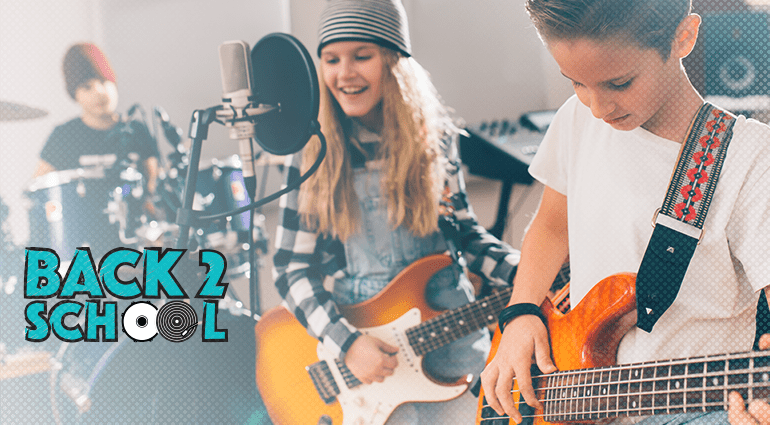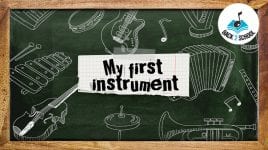
Music is fun, and making music is even more enjoyable. There are many reasons why everyone should learn a musical instrument 🎸🎹🥁🎶 and this applies to both children and adults, of course! It’s easy to understand why parents would want to provide their kids with the opportunity to engage in this wonderful hobby. After all, learning a musical instrument has numerous benefits for both children and adults – cognitive, motor, mental, and many more. Here are 10 reasons why you should also introduce your children to the world of playing music or embark on a musical journey yourself as an adult!
Under this link, you’ll find the perfect instruments for starting your journey
#Back2School
1. Learn a musical instrument to be more relaxed!
According to several researchers, playing a musical instrument can help both adults and children reduce heart rate and blood pressure, regardless of their skill level. It can also lower levels of stress, anxiety, and depression.
Furthermore, playing a musical instrument can enhance problem-solving abilities and improve overall mental capacity. Playing a musical instrument leads to entering a “flow state,” a term coined by the renowned psychologist Mihaly Csikszentmihalyi. It’s a state that lies between boredom and a state of high alertness. This state allows one to synchronize with the music and play smoothly. Certainly, being relaxed is a good reason to learn a musical instrument, but I would say it’s an excellent reason to face the many challenges we encounter in everyday life.

2. Active music making can promote intelligence & speech ability
More than ten years ago, brain researchers from the Max Planck Institute for Cognitive and Neurosciences in Leipzig were already investigating the influence of musical training on speech and music processing in children. In their study, Sebastian Jentschke and Stefan Koelsch came to the conclusion that music and speech are processed in the same brain regions. This means that musically advanced children are also advanced in their language skills. And this is absolutely helpful at school and in the working world afterwards.

3. Learn a musical instrument and strengthen self-confidence
If children and/or adults learn to play an instrument, they will overcome small, and later larger, stumbling blocks with more ease. With each new learning progress they remove a hurdle from their path. Gradually they get better and better at problem solving and soon they can do something that not everyone can do. This strengthens their self-confidence and makes them strong, mentally, even in non-musical situations.

4. Learn a musical instrument and get to know yourself better
The fact remains that when kids are occupied with an instrument, by default they also deal with themselves, their body and mind. They will listen very carefully to themselves. To master an instrument ultimately means precise and intricate body control. This works in the interplay of the senses and the ability to self-reflect is a quality that will help the kids throughout their lives.

5. Learn a musical instrument to understand the word ‘respect’
Musicians have to be considerate of each other and listen to one another. If everyone in a band or orchestra plays only for themselves, the song or composition would be a “soup of noise”. Everyone has his or her specific task for painting the “big picture” while simultaneously helping and supporting each other. This is a personal learning process in respecting others around you, which promotes social competence and is important to be learned at every age.
Developing appropriate social behaviour is crucial, especially when you are young and just starting with music, and it becomes imperative when you want to play with bands and professionals as an adult.

6. Learn a musical instrument to increase cognitive abilities & concentration
Movement and coordination, feeling and touching, hearing and seeing are super-connected when making music, not to mention the use of imagination and creativity. Cognitive abilities and mental agility are increased almost instantly. According to a study by neuroscientist Dr. Ines Jentsch from the University of St. Andrews, UK, “higher musical education through higher speed in solving tasks, without compromise in accuracy, leads to more efficient information processing and thus increased ability to concentrate“.

7. Learn a musical instrument and train patience & stamina
It may take some time before beginners master an instrument to some extent and plays their first small concerts. Beginners practice diligently and joyfully, but sometimes discontentedly and perhaps want to give up. It’s all down to a constant encouragement, that will help them to stick to the craft and soon look back on the efforts as fruitful. That, undoubtedly, gives them a real feeling of happiness.

8. Creative to the bone
The instrument opens a door to completely new worlds! It lets you try things, experiment, simply do something unknown and unprecedented. Maybe you will play familiar tunes with your own individual touch. Maybe you will improvise and put the perfect tone in the perfect context and at the right moment. If you allow yourself (or others) to learn a musical instrument, you’ll give them (and yourself) something they can live their inner life with for the rest of their lives.

9. The instrument as a valuable friend
The very first instrument, especially, becomes the best friend, the confidante, who is faithful to the person in all situations. Whether it’s a violin, trumpet, flute, guitar, keyboard or accordion, the person will appreciate the instrument’s value because of a a very special, intimate relationship with it. And even the secretive or shy personality can express the feelings they wouldn’t want to or even know how to otherwise. An outlet of emotions.

10. Music Makers – a community of like-minded people
And finally: playing an instrument is much more than operating a machine. It’s a way of life and people share it with an unbelievable number of like-minded people. Most musicians have had the same or very similar experiences from playing the first note to playing complex pieces of music. An extraordinary community with a great sense of togetherness.

Ready to learn a new instrument? Check out our recommendations, click HERE!
4 comments
Leave a Reply
You are currently viewing a placeholder content from Facebook. To access the actual content, click the button below. Please note that doing so will share data with third-party providers.
More InformationYou are currently viewing a placeholder content from Instagram. To access the actual content, click the button below. Please note that doing so will share data with third-party providers.
More InformationYou are currently viewing a placeholder content from X. To access the actual content, click the button below. Please note that doing so will share data with third-party providers.
More Information





David James Weston says:
I couldn’t agree more, and from experience I still regretted not continuing first with piano lessons, and later with clarinet lessons, and apart from singing, I have been left with harmonica performance !
Joe says:
Hey David, at least you still have singing and harmonica! Some people have given up altogether. Never too late to learn or re-learn though 😉
jillop says:
Attention Deficit Disorder (ADD) is usually identifiable in early stages of childhood. There are instances when the disorder continues until adulthood if treatment is not prompt or effective. This is known as Adult Attention Deficit Disorder (AADD). The impact of AADD is severe compared to ADD because as an adult, coping strategies are required to a greater extent with regard to disorganization and other symptoms of the syndrome. The visible signs and symptoms of the disorder in adults are as below:
Impulsiveness. ADD adults have difficulties handling their impulsiveness. Sudden bouts of anger, impulsive spending, butting into conversations, and breaking relationships are all side effects of impulsiveness. https://jillnelsom.imblogs.net/59286444/real-estate This in turn leads to lack of cordial atmosphere and feelings of regret at later stages.
A high level of distraction. The ADD adult is always thinking of a myriad subjects and incidents that leave him/her unfocused and distracted. Apart from this, external stimuli introduce further distraction to the overactive mental process. When the adult leaves home and mixes with the society, he/she is bombarded with words, visuals, and noises that disturb and irritate.
pay to write my essay says:
US Essay Writer has the best professional essay writers online in USA. They have highly qualified and experienced essay writers in their cabinet. I personally used their pay to write my essay service, it’s really helped me to write my essay. The good thing about US essay writer is they provide you with their service at an affordable range. US Essay Writer is a top-rated essay writing company in USA.